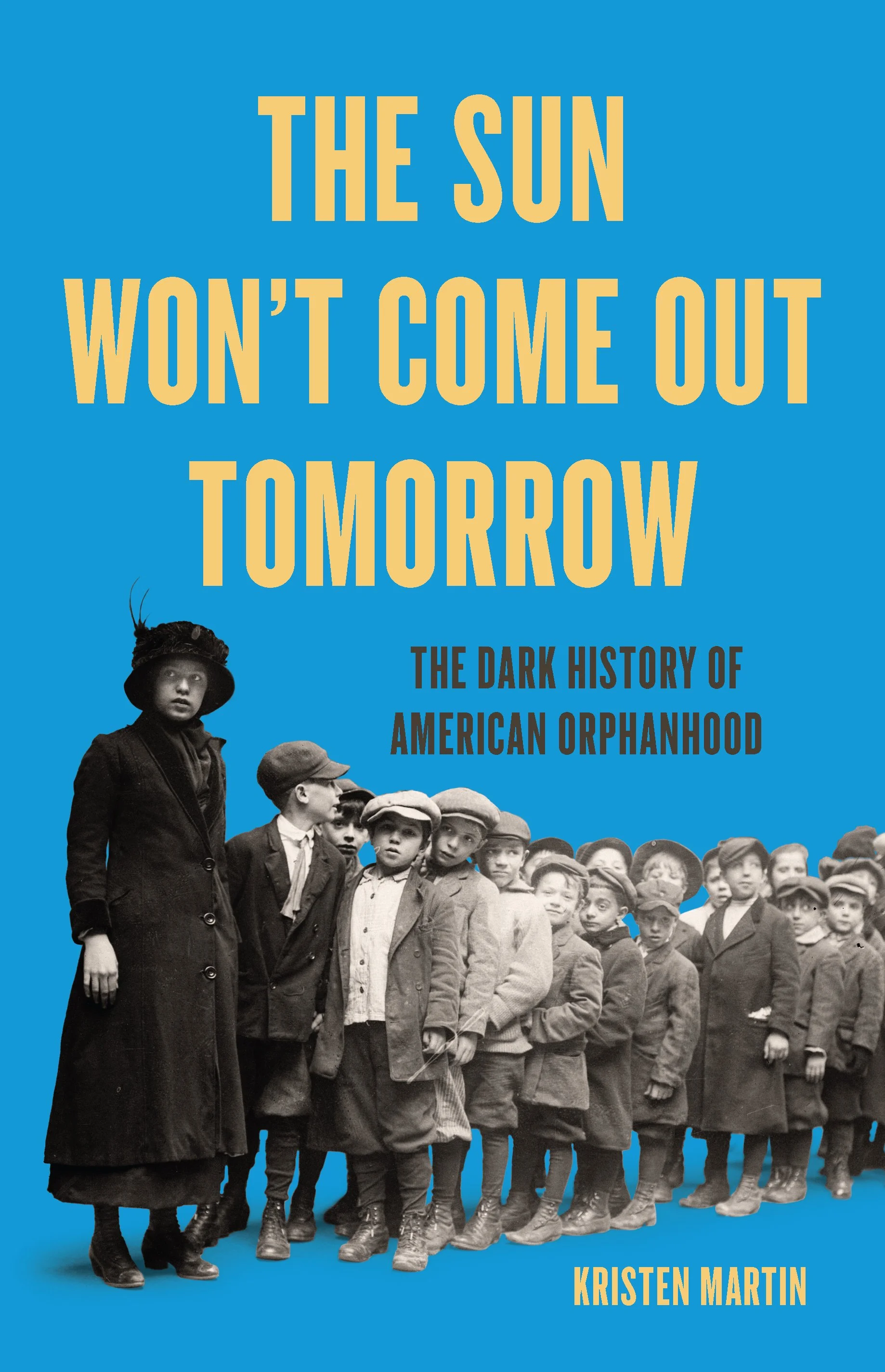Out now from Bold Type Books
Order from Bookshop.org, Barnes & Noble, or other book retailers
Read an excerpt on LitHub
The orphan story has been mythologized. Step one: While a child is still too young to form distinct memories of their parents, they die in an untimely fashion. Step two: Orphan acquires caretakers who amplify the world’s cruelty. Step three: Orphan escapes and goes on an adventure, encountering the world’s vast possibilities.
The Sun Won’t Come Out Tomorrow upends this story. Alongside powerful critiques of popular orphan narratives, from Annie to The Boxcar Children to Party of Five, journalist Kristen Martin explores the real history of orphanhood in the United States from the 1800s to the present. Martin reveals the mission of religious indoctrination that drove the first orphanages, the orphan trains that took poor children out West, and the inherent racism and classism that still underlie the United States’ approach to child welfare.
Through a combination of in-depth archival research, memoir (Martin herself lost both her parents as a child), and cultural analysis, The Sun Won’t Come Out Tomorrow is a compellingly argued, compassionate book that forces us to reconsider autonomy, family, and community. Martin delivers a searing indictment of America’s consistent inability to care for those who need it most.
REVIEWS
“The history is sweeping, damning and infuriating, and requires the depth and care that Martin deploys to understand it fully…. The Sun Won't Come Out Tomorrow contributes to a cultural understanding in which orphanhood is neither manufactured, nor idealized, nor divorced from its dark history. Yet, it still carries an optimism that would make Orphan Annie proud — the hope that we might move beyond the fictional tropes and toward an accountability to American families that we have not yet achieved." —Gretchen Sisson for The Washington Post
“The Sun Won’t Come Out Tomorrow is a deeply researched, comprehensive rebuke to sentimental depictions of orphans as plucky adventurers, exposing the shameful reality of this country’s treatment of its most vulnerable citizens throughout its history and up to this very moment.” —Alice Stephens for The Washington Independent Review of Books
“Powerful… a damning assessment of America as a society built on the exploitation of children.”—Publishers Weekly
“A thought-provoking look at a system that has always been dysfunctional.” —Booklist
“[Martin's] impeccably researched account is eye-opening and tragic, illuminating how religious extremism and racism, among other factors, determined the welfare of generations of children.”—Columbia Magazine
PRAISE
A LitHub Most Anticipated Book of 2025 and An Amazon Editors’ Pick for Best History Books of January 2025
“Kristen Martin’s The Sun Won’t Come Out Tomorrow is a deeply compassionate, rigorously researched, and passionately argued exploration of the gap between the myths and realities of American orphanhood. With incisive insight, broad-ranging cultural analysis, and unflaggingly humane attention, Martin asks us to turn our gazes away from the romances of individualism, bad actors and plucky heroines, toward the systemic forces—economic inequality, racist institutions, and legacies of violence—that have always shaped the lives of American children. From its accounts of slave auctions to family policing, orphan trains to residential boarding schools, this book is ultimately asking, Whom have we failed? and, How can we care for them better? This searing history left me outraged, enlightened, and full of deepened conviction that we need to keep peeling away our collective American mythologies in order to reckon with our hardest truths.” —Leslie Jamison, author of Splinters
“Kristen Martin’s searing and essential dive into the truth and fiction of American orphanhood makes clear the racism and classism that undergird our treatment of vulnerable children and their families. Martin shows the reality is far from our comfortable myths, and that we can’t solve this long-standing crisis if we don’t first accurately name it.” —Roxanna Asgarian, author of We Were Once a Family
“Kristen Martin’s brilliantly researched The Sun Won't Come Out Tomorrow sifts through our culture’s phony tales about plucky orphans to tell the harrowing history of orphans and orphanages in America. Probing with compassion our longstanding failure to tend the untended and the vulnerable, who are our children, and writing as an orphan herself, Martin has produced an indictment long overdue—and indispensable.” —Brenda Wineapple, author of Keeping the Faith
“For decades the history of America’s orphans has been ignored, abandoned, dressed up and distorted. But finally, Kristen Martin has shined a bright light on the real lives of children who have been orphaned by death or circumstance. With immense courage and capability, she exposes this hidden American history, and in doing so, she compels us to see what is true, not the comforting, nonsensical stories we tell ourselves about what it means to be an orphan. Martin was herself orphaned as a young teen, and she weaves her powerful personal story throughout this incredibly important book.” —Christine Kenneally, author of Ghosts of the Orphanage
“In The Sun Won't Come Out Tomorrow, Kristen Martin offers a compelling exploration of orphanhood in America. With meticulous reporting alongside her personal story—both of her parents died when she was a teenager—Martin uncovers how orphanhood has been portrayed and experienced since the nation’s founding. She critiques our cultural embrace of ‘rescue’ stories, from fictional characters like Little Orphan Annie to the very real decades-long initiative that sent thousands of so-called ‘dangerous’ immigrant children from overcrowded Eastern cities to labor on Midwestern farms. Martin also addresses the painful legacy of separating Native and Black children from their families and communities. Yet, amid this difficult history, she also offers a sense of hope, showcasing the groundbreaking efforts of those committed to systemic change. Provocative and captivating, this book challenges our assumptions and illuminates the harsh realities of orphanhood in America.” —Gabrielle Glaser, author of American Baby
